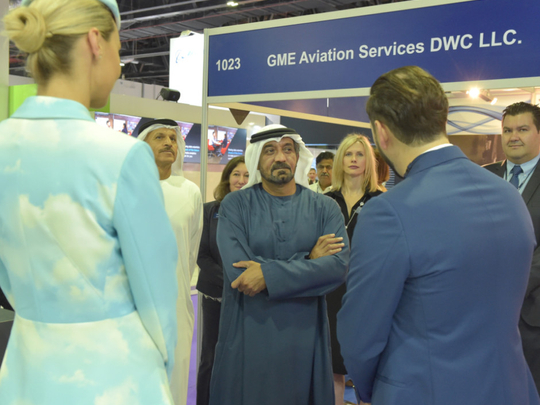
Dubai
Dubai South said that it will start handing over units in phase one of its Aerospace Supply Chain facility by the end of 2018, with phase two of the facility now under development.
Mohammad Al Falasi, director of business development at Dubai South, said that 50 per cent of phase two is already pre-leased, and that phase three is currently under design. The facility will house aviation service providers.
“Phase one of the Aerospace Supply Chain has been designed to host aviation companies in the MRO (Maintenance, Repair, and Overhaul) sector … and it’s fully operational. Phase two is a replica of that, with an additional four units, so a total of 14 units, and will be handed over by the end of 2018,” he told Gulf News on the sidelines of MRO Middle East.
Al Falasi said that he expected the other half of phase two of the facility to be booked by the end of this year. Dubai South is currently in talks with local and international MRO companies, as well as small and medium enterprises about setting up presence there.
Dubai South is also in talks to bring in businesses from other sectors including education and training, other aviation services, and even hotels and retailers.
Al Falasi said he expects growth at the region’s airlines to spur growth in the MRO sector and drive demand for aviation service providers.
According to research from US-based consultancy ICF, the Middle East’s MRO market is expected to grow at a 7 per cent rate, and double in size by 2026 to see a spending value of $11 billion — up from $5.4 billion in 2016.
That will come as airlines add more aircraft to their fleet. The Gulf’s big three carriers — Emirates Etihad Airways, and Qatar Airways — alone are expected to take delivery of 400 aircraft in the next five years, ICF data showed.
“We sense the urgency to provide a better solution and a quick solution for our customers. The growth within this region of Emirates, flydubai, Air Arabia, and Etihad is driving the market to great opportunities,” Al Falasi said.
And he believes Dubai South can be a hub for such growth in the Middle East’s airlines, as well as an MRO hub to serve airlines in neighbouring regions such as Africa and Asia where Al Falasi sees growth.
“Looking at the available soft and hard infrastructure within Dubai South, there’s no such infrastructure available within a seven-hour radius, so Dubai is positioning itself as a hub for the airspace industry,” he said.
“The aviation industry contributes to 28 per cent of our GDP (Gross Domestic Product), and our role here within the coming five years is to take that to 35 per cent.”












